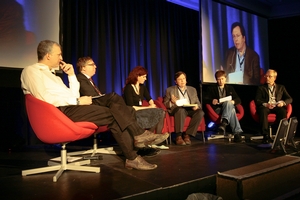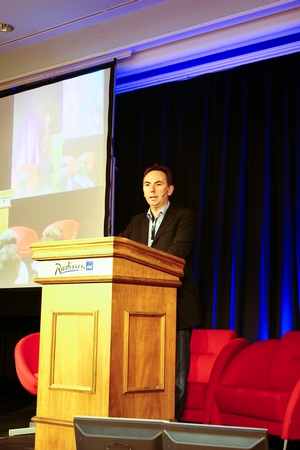Post 9/11 journalism discussion kick-started the conference
”Disturbing news” was the word used to describe the information that was presented at the opening seminar of the GIJ conference Thursday morning. As Sami al-Hajj was delayed, the session “What happened to journalism after 9/11” opened the conference.
 xxx  DISTURBING ON PAST 9/11 JOURNALISM: Chuck Lewis from the American University School of Communication revealed how US government has presented hundreds of false statements concerning national security threats. The participants in the panel are (from the left): David Banisar, David Smallman, moderator Brigitte Alfter, Chuck Lewis, Andrei Soldatov and Matti Stenrosen.
 xxx  RECORD BREAKING CONFERENCE: GIJC board chairman Jan Gunnar Furuly said in his welcoming speech that the conference is already record breaking with participants from 86 countries. |
First, GIJC board chairman Jan Gunnar Furuly started with welcoming all the participants, by referring to the historical ground we are on, where the 1994 Olympic Games took place.
- The Olympics have the slogan «faster, higher, stronger». Here, we can say «deeper, braver, smarter», he said.
Strategic communication
The broad panel took place after a short video presentation. They presented views on anti-terrorism laws, media coverage, protection of sources and different ways that journalism has been controlled after the terrorist attacks that happened seven years ago today.
How the media presented the situation was discussed by Chuck Lewis from the American University School of Communication. He has explored statements on national security threats after 9/11, and found 935 false statements from the government. Most US media just reported the false statements that came from the government, and there was very little contradiction, Lewis described.
Media lawyer David Smallman also pointed out how strategic communication and information warfare was used by the American government to influence foreign countries, but also the domestic public.
- The governments will not stop using these techniques, but investigating reporters can learn about them so that an analytical framework exists, to recognize manipulation and distortion of information, he said.
Changing laws
A different view on journalism after 9/11 came from Russian journalist Andrei Soldatov. In Russia, no books on the subject has been published or translated, and Russian public still see the Al-Qaida as an illusion, he described. The word terrorism has still been used more by the government, and new laws prohibit journalists to enter areas where «counter-terrorism operations» are taking place, Soldatov said.
David Banisar from Privacy International gave an overview on the different changes in laws on surveillance, source protection and state secrets that have changed after 9/11. Swedish journalist Matti Stenrosen presented his own weblog where different people discuss subjects related to this subject.
- These laws may have fundamental effect on how you do your job, Banisar said.





